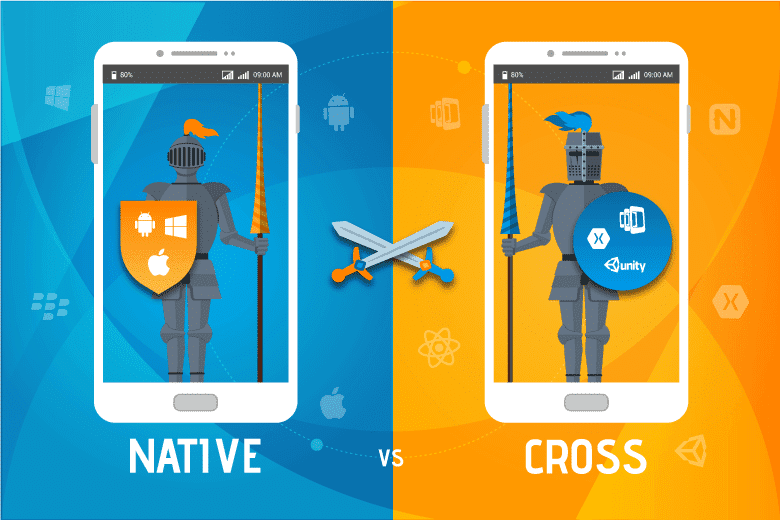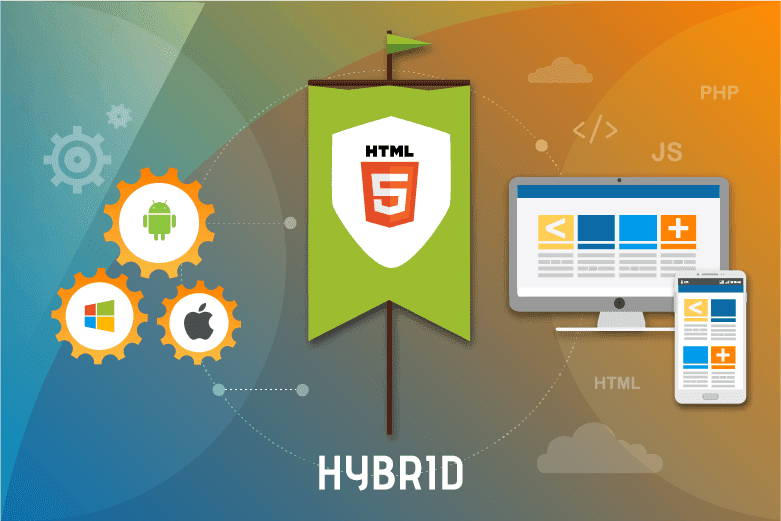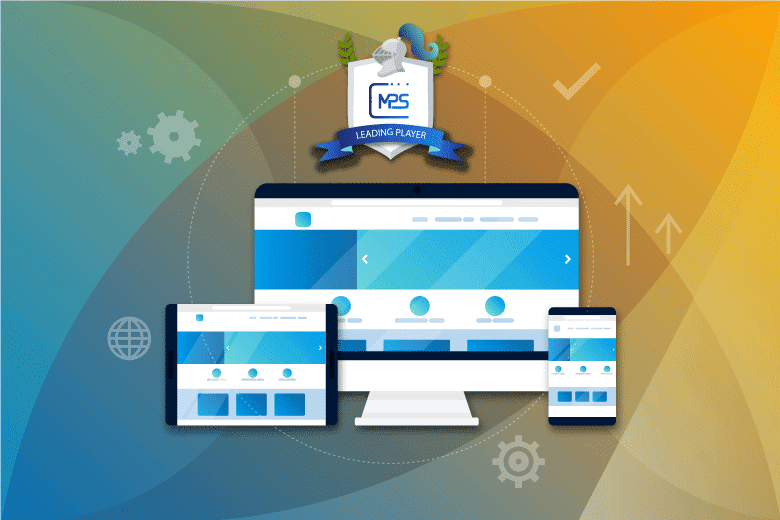Cross-Platform vs Native App Development: Which is Better?
READ WHOLE ARTICLE

The global mobile app development industry is expected to balloon into an enormous $200 billion market by 2020. iOS and Android platforms continue to dominate the smartphone industry with a combined market share of a stupendous 99.6%. To reach the target audience and create superior brand experiences, it is critical that businesses develop apps for these two platforms. And, with that, they face the most important question that’s posed among the app development circles these days – Native or Cross-Platform?
This approach comparison between native and cross-platform is important because they both come with their own sets and advantages and drawbacks, which makes them suitable for varying business objectives.
Now, before we begin dissecting the two development options, let’s take a good look into what these two options really mean.
What is native app development?
Native app development involves the development of the app to run on a specific device or device’s platform. The most common mobile platforms are iOS and Android. So, a native iOS app has been specifically developed and optimised to run on devices that run on iOS. Similarly, Android native apps are built to run from the ground up on Android devices. Native apps are built using different technologies. iOS developers typically build native apps for the platform on Objective-C or Swift. Android developers create native apps on Java.
Here are the most important pros and cons of native app development:
Pros of native apps
- Native apps are optimized for a specific software or hardware configuration. Therefore, they can take full advantage of the hardware and software on which they run. They can use the latest device technologies like GPS.
- They are faster, smoother to use, and offer a more fluid experience, as they are optimized for their device.
- Native app development involves UI customization for the specific platform. The users get to experience a similar user experience as that of the OS on which their device is running.
- The extensive knowledge base is provided by the platform for app development, making it easier for developers to create native apps.
Cons of native apps
- The single biggest case against native app development is the cost factor. Platform dependency of the native app means that the businesses must develop and release apps for each platform, instead of just one. That shoots up the cost by many multiples.
- Developing dedicated apps for each platform is a time-consuming process. It can result in missed opportunities.
- Once the native apps are developed, they require additional staff for maintenance and support, as each native app requires talent that has expertise in that specific platform.
PWA vs Native App: How to Choose the Right Mobile Applications
What is cross-platform app development?
Unlike native app development, cross-platform app development involves building apps that can run on multiple platforms. Instead of developing platform specific apps for iOS, Android, Windows, and so on, app developers can simply create one app that can operate on some or all the mobile platforms. Cross-platform apps are typically built using 3 development environments:
- Unity
Unity was designed as a game engine with a built-in integrated development environment and was used to develop video games for multiple platforms. Today, it is used to create cross-platform apps for a vast variety of mobile platforms.
- PhoneGap
PhoneGap is an open source mobile app development framework developed by Nitobi, but later purchased by Adobe. PhoneGap employs standards-based technologies to bridge different web applications and mobile devices.
- Xamarin
Xamarin is another open source app development framework with an IDE. The most important advantage offered by Xamarin is that developers can code in C# on the IDE and this offers many improvements over Objective-C. More importantly, developers can create native apps for Android, iOS, and Windows platforms using Xamarin’s SDK in Microsoft’s Visual Studio IDE.
Here are the most important pros and cons of cross-platform app development:
Pros of cross-platform apps
- The app deployment is much faster across different platforms. Developers do not spend time developing apps for individual platforms. They can create the code for one app and use the same codebase to port the app into another platform. This not only saves the time required for app development but also achieves substantial cost-savings for the business.
- The end users get a unified user experience across all the devices and platforms. Someone who switches from iOS to Android or vice versa, for instance, will not notice any difference in the experience offered by the apps, as the UI is the same.
- Massive plug-in libraries on cross-platform app development platforms like PhoneGap allow developers to deploy them and take advantage of enhanced functionalities without spending a considerable amount of time on developing each functionality.
- By accelerating app development, cross-platform apps allow businesses to grasp business opportunities that present themselves from multiple platforms, when they present themselves, without having to wait for the app development and deployment on that platform.
Cons of cross-platform apps
- Functionality limitations are a major problem with cross-platform apps. They are not always able to utilise all the technologies and capabilities available on a device or platform. Moreover, cross-platform apps are not always easy to integrate with the platform’s local settings like preferences, notifications, and so on.
- Each cross-platform app development environment comes with its own niche technologies. Therefore, it is not always possible for enterprises to switch their vendor and migrate the code to the new vendor seamlessly.
- Cross-platform app’s code does not run directly in the device’s language. Instead, it is translated by another language. This layer of translation slows down the app performance. However, modern cross-platform apps run so smoothly that the difference in performance is not usually visible to the untrained eye.
- The user experience usually suffers in the case of cross-platform apps. Creating a smooth, bug-free, and unified experience across all devices, screen sizes, and platforms is easier said than done. A great deal of attention is required to ensure that UX is not compromised on any devices or platforms.
- Technical issues like security flaws, bugs, and so on, when present in cross-platform apps, manifest themselves across the platforms affecting the user experience of a vast number of people.
What is the hybrid app?

In simple terms, hybrid apps are the lovechild of native apps and cross-platform apps.
Hybrid apps are built to take advantage of almost all the functions and features offered by the platform and device on which they run. Although they cannot utilise all the features as native apps do, the difference between hybrid apps’ capabilities and native apps’ capabilities is not vast.
Another advantage of hybrid apps is that they can be built on a single app development framework and the same codebase can be used to deploy it across multiple platforms with a few modifications. This is made possible by the native wrappers. Once the hybrid app is created, it is integrated with a native wrapper of a specific platform and released on that platform. So, Hybrid App + iOS Native Wrapper becomes an iOS app. Likewise, Hybrid App + Android Native Wrapper becomes an Android app.
The native wrapper is essentially a dedicated browser inside the app, and its sole purpose is to run the app for which it was developed. The app inside the integrated browser behaves like web pages, and therefore, Hybrid app is said to run in WebView.
Here are the most important pros and cons of hybrid apps:
Pros of hybrid apps
- Hybrid apps combine the advantages offered by both native and cross-platform apps into one seamless experience that overcomes most of the limitations inherent to those approaches.
- The interface design of hybrid apps is almost as superb as that of native apps. In fact, when necessary, hybrid apps can also be imparted with native-like UI elements, effectively bridging the gap between native and hybrid app development approaches
- The same app can be deployed across multiple platforms with ease.
- The best part about hybrid apps is that they can be run on any modern browser, just like any other web app.
- They deliver consistent UI and UX across different platforms and devices, creating a unified brand experience for the users.
- Their performance is on part with the native apps for the most common use cases.
Cons of hybrid apps
- When it comes to 3D, HD games, and other high-performance-oriented apps, native apps fare much better than the hybrid apps.
- Hybrid apps rely on plugins to access native features. When a manufacturer or OS maker introduces a new technology or feature, the plugin to utilise that feature may not be readily available. So, hybrid apps are often slow to take advantage of native innovation in mobile devices.
What Is the Difference Between a Mobile App and a Web App?
Conclusion

The decision to choose between the various mobile app development approaches should be based on business objectives. If your business intends to take advantage of native-level functionalities and features available on a platform, then native or hybrid app development may be better suited for you.
On the other hand, if you are a growing business with resource-crunch or operate in a high-competition industry where late deployment of apps can cost you market share, then it’s better to go with cross-platform or hybrid app development approach.
Likewise, there could be many other business factors that could determine the best app development approach for your business at any given stage of your organization’s growth. In any case, it is critical that you choose an app development part that has a proven track record of delivering superior apps for the platforms of your interest.
Multi-Programming Solutions has established itself as a leading player in cross-platform and hybrid app development. It has an excellent track record of delivering fluid-smooth, brilliant-looking, and high-performance apps for a vast number of platforms. Multi-Programming Solutions is uniquely positioned to help you catapult your organization into the next stage of a rapid growth trajectory by helping you deploy superior quality apps across all the major mobile platforms and reach your target audience on them. We know a lot a the bout specifics of developing cross platform applications and features of native apps. Contact us if you need help.

36 Kings Road
CM1 4HP Chelmsford
England


